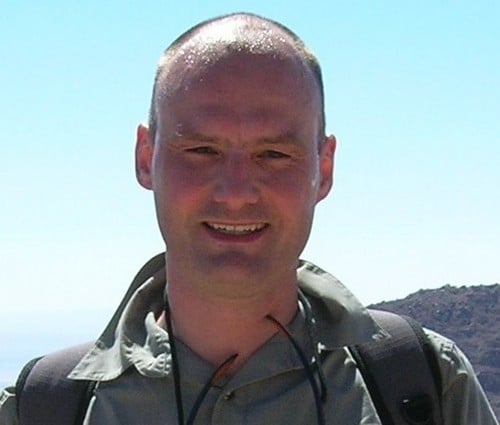In this DeSmog UK epic history post, the battle continues between Bob Ward – working at the Royal Society at the time – and ExxonMobil’s army of climate deniers.
Bob Ward, the then head of media at the Royal Society, was shocked when members of Koch-funded public policy organisation the Competitive Enterprise Institute (CEI) heckled professor David King, the government’s chief scientific, during a visit to the United States in 2006.
Ward began to wonder if there had been an upsurge in attacks by deniers on science during the previous months, and soon found himself going head-to-head with the world’s most powerful company on the issue of climate change.
“I was trying to evaluate to what extent ExxonMobil might be controlling that activity,” he told me. “I prepared an internal memo about ExxonMobil and what they were publishing in the UK.”
ExxonMobil Calling
This communique was leaked to the Guardian, which published the story. “I got a phone call from ExxonMobil, from their PR team in the UK, and they wanted to come and see me… during the course of the conversation he ventured the fact that they were planning to stop funding a number of these sorts of think tank campaign groups.”
Ward was delighted with the meeting and believed that Exxon was about to take steps to end its funding of climate sceptic think tanks.
But, in August 2005, the oil company sent him its 2005 Corporate Citizenship Report which “had almost verbatim exactly the same uncertainty statements about climate change.”
Ward wrote immediately to Nick Thomas, ExxonMobil’s UK corporate affairs director, and said it was “very disappointing” that the report “leaves readers with such an inaccurate and misleading impression of the evidence on the causes of climate change.”
This time, Ward gave the letter directly to the Guardian, which duly followed up its earlier story on 20 September 2006. ExxonMobil’s response was surprising.
Concerted Campaign
There followed a concerted and multi-pronged campaign to effectively bully the Royal Society out of entering the debate over the truth of climate science.
The oil company issued a press release which stated: “ExxonMobil gives financial support to organizations which research significant policy issues and promote informed discussion on issues of direct relevance to the company.
“These organizations do not speak on our behalf, nor do we control their views and messages. Our financial support for such organizations is publicly posted on our website. We review funding of these organizations on an annual basis. As we are currently in that review process, it would be premature for us to discuss funding decisions for any particular organization.”
William O’Keefe, the American Petroleum Institute (API) lobbyist, dashed out a letter the day after the Guardian story appeared and signed off as CEO of the climate sceptic Marshall Institute.
Groupthink
The missive to the Royal Society accused Ward of “advocating censorship” and referring to George Orwell’s phrase ‘groupthink’ to suggest that the Royal Society was engaged in a Stalinist suppression of honest debate.
“The censorship of voices that challenge and provoke is antithetical to liberty and contrary to the traditions and values of free societies,” O’Keefe wrote without irony. “That such a call comes from such a venerable scientific society is disturbing and should raise concerns worldwide about the intentions of those seeking to silence honest debate and discussion of our most challenging environmental issue – climate change… You are attempting to stifle that debate and that is dangerous.”
This line of attack was spontaneously adopted by Dominic Lawson, Nigel Lawson’s son and heir, in the lefty Independent, where he asserted that “the debate on climate change is far too important to be shut down by scientists.”
One Step Further
The oil giant appears to have then gone a significant step further to protect its reputation from attack.
“I then went on holiday to the US for a couple of weeks to see my parents, so I was away in Oregon,” Ward recalls.
“I got a phone call from Chris Huhne, who was at that time the Lib Dem environment spokesman, and he said, ‘I’ve been phoned by ExxonMobil who implied that you’ve been sacked by the Royal Society because of the letter’. I was kind of shocked that they’d try and resort to such a clumsy tactic.”
In response, Ward wrote to Ken Cohen, the vice president for public affairs at ExxonMobil in Texas, demanding an explanation and “to seek your assurance that your organisation will not attempt to propagate damaging rumours about me”.
And, in Britain, Huhne raised his concerns in the House of Commons and asked the MPs: “Should we be buying fuel from people such as ExxonMobil? I do not want even indirectly to be helping to fund bodies such as the International Policy Network and the Competitive Enterprise Institute. I don’t think the government should either.”
Up next on the DeSmog UK epic history, we follow calls made by the original American oil barons – the Rockefellers – for ExxonMobil to stop funding climate denial.
Photo: Twitter
Subscribe to our newsletter
Stay up to date with DeSmog news and alerts






